How much should political parties know about you?
With so much of our lives shared online these days, it is often easy to get hold of someone’s personal data. Political parties can use this information to target voters with specific messages tailored to each person’s interests. At the University of Victoria in Canada, Professor Colin Bennett, Dr Smith Oduro-Marfo and Jesse Gordon investigated how political parties around the world use their citizens’ data and what this means for democracy.
Talk like a political scientist
Data protection — laws designed to protect the right to privacy and regulate how organisations collect and use personal information
Democracy — a system of government in which the population elects their leaders and enjoys basic rights and freedoms to participate in public affairs
Echo chamber — an environment in which you are only exposed to views that match your own
Electorate — all the people entitled to vote in a population
Micro-targeting — a form of advertising in which the advert is specifically targeted to the individual’s interests and background, based on personal data that has been harvested about them
Polarisation — division into opposing groups based on specific opinions or beliefs
Swing voter — a voter who has not yet decided which party to vote for
Wedge issue — a very divisive issue, used to draw voters away from an opposing party
In the run-up to elections, social media is awash with political advertising. In the past, political parties campaigned using messages that could target a wide audience. Today, thanks to the incredible wealth of personal data that is available about each of us, campaigners know far more about a voter’s likes and dislikes so can target their political messages directly to individual voters and groups.
These micro-targeting practices raise issues of privacy and data protection and lead to questions about the health of our democracies. To campaign effectively, just how much should political parties know about their voters? Professor Colin Bennett, a political scientist at the University of Victoria, worked with his former students, Dr Smith Oduro-Marfo and Jesse Gordon, to investigate how different countries use personal data for political campaigning, and what this means for democracy.
How do political parties collect voters’ personal data?
“Political parties could have a wide range of personal data on individual voters,” says Colin. In addition to names and addresses from electoral registers, they might have information about people’s political views from petitions they have signed online or comments they have made on social media. “These practices are not just observed in Western democracies,” says Smith. “In many African countries, the proliferation of the internet and mobile phones has created an opportunity for political parties to harvest personal information.”
In some countries, political parties buy personal data from data brokers, who harvest information (e.g., online shopping habits, social media activities and even health conditions) from the internet and use it to construct profiles of individuals. Many people are unaware of quite how much of their data they are permitting others to access. “If a US citizen has subscribed to anything without reading the privacy policy, it is possible their data has been sold to a political party,” says Jesse. “In the US, political parties have few privacy restrictions and lots of campaign financing, so they can collect a lot of profiling information from data brokers.” In contrast, while data brokers do exist in other democracies, privacy laws limit what personal information they can sell without an individual’s consent.
How do political parties use voters’ personal data?
Once a political party knows what a voter likes and dislikes, they can personalise their campaign messages to align with that person’s views. “Micro-targeting can happen when a party has enough information on a person or group to tailor messaging to their specific interests,” explains Jesse.
Reference
https://doi.org/10.33424/FUTURUM499
While this approach can help voters learn about parties’ stances on issues close to their heart, it also raises significant concerns. “Some argue that micro-targeting encourages parties to deliver messages on ‘wedge issues’ that drive polarisation,” explains Colin. “It can also produce ‘echo chambers’, where individuals only see information algorithmically calculated to match their presumed interests.” This can lead to narrow perspectives on a party’s mandate and can limit exposure to different viewpoints. “Micro-targeting can lead to political parties focusing on smaller groups of swing voters rather than the broad electorate,” says Jesse. “At its most extreme, it’s possible for a party to make entirely opposite campaign promises to different groups.”
While micro-targeting is not yet a common technique in many Global South countries, Smith notes that the harvesting of phone numbers from digital and non-digital sources in many African countries is used to send bulk texts to thousands of voters. “Although this ‘mass-targeting’ technique allows small political parties to reduce their campaign costs, the absence or emergent nature of data protection laws in many of these countries may not adequately protect against personal privacy breaches,” he says. There is also a risk that bulk messages sent by faceless entities can spread false information, which can undermine trust in politicians and negatively impact the quality of democratic participation.
Why is there tension between data privacy and political campaigning?
Finding the balance between data protection and providing parties with information on voters’ concerns is tricky. “Political parties have the right to know about voters’ beliefs and the duty to communicate with the electorate,” says Colin. “But how much voter information do they actually need?” While some argue that the more information the better, others say this opens the door for manipulation. “Democracy relies on political parties that understand their voters,” explains Jesse. “However, there is a certain point where people may feel uncomfortable with how their personal information is collected and used.”
How do these tensions play out in different countries?
The team analysed relationships between data protection laws and political campaigning in different countries and discovered a wide variation in how privacy laws apply to political parties. In the US, weak privacy regulations encourage a huge voter analytics industry, while in Japan, harvesting personal data and many forms of political campaigning (including micro-targeting and door-to-door canvassing) are prohibited. Political parties in the EU are regulated by strict data protection laws that limit how they can gather and use people’s information.
Many countries in the Global South are beginning to adopt digital technologies, such as fingerprints, to verify voters’ identities when they vote. “This is supposed to prevent fraud, but most Western democracies don’t collect such invasive data from their voters,” says Smith, who is concerned about gathering sensitive personal data in countries without strong data protection laws. “I hope there will be a matching commitment to developing data protection regulations,” he continues. “If not, such data could be abused, which could dissuade citizens from registering to vote and therefore undermine democracy.”
It is clear that as the digital world advances, data protection and privacy must be a priority for ensuring that elections remain fair and democratic.
 Professor Colin Bennett
Professor Colin Bennett
Department of Political Science, University of Victoria, Canada
Field of research: Political science
Research project: Understanding how political parties access and use voters’ personal data, and what this means for privacy and democracy
Funder: Social Sciences and Humanities Research Council of Canada (SSHRC)
About political science
Political science involves using scientific techniques to study political trends and their effects on society. “In recent years, there has been a widespread debate about foreign influence on elections and the spread of misinformation,” says Colin. “It’s now easy for anyone to anonymously set up social media accounts and spread false information.” While some countries have regulations to suppress misinformation, it is a difficult battle when social media companies typically focus on driving engagement. “This has been exploited by foreign actors to erode democratic stability,” says Jesse. “It has allowed conspiracies to gain mainstream footings and impacts how people engage with politics.”
Despite efforts to quell this trend, it is expected to remain a key issue for the next generation of political scientists. “Young people need to be critically aware of the erosion of democratic values,” says Colin. “They need to know how companies collect and process their personal data, and how to address it.”
The advent of artificial intelligence (AI) has also been disrupting political systems. “We live in a time of growing misinformation, resource scarcity, inequality and climate change,” says Jesse. “Each of these issues may be improved or made dramatically worse by AI systems.” For instance, AI raises the stakes for misinformation, as it becomes easier for malicious actors to generate authentic-looking deepfake videos of politicians saying or doing things that never actually happened.
Smith notes that there are many opportunities emerging in the Global South as countries adopt new technologies and surveillance techniques. “We should always be asking: is this change improving welfare and well-being?” he says. “Is it making governments more efficient and accountable?” The end goal of political science should be to understand which political systems work best for the people they serve, so understanding these changing trends is essential.
Pathway from school to political science
At school and beyond, study humanities and social science subjects, such as history and social studies.
At university, degree options include politics, political science, international relations, sociology, or philosophy, politics and economics.
“Politics touches every subject,” says Colin, so consider how your interests could intersect with a career in political science. “Be driven by what you are curious about and interested in,” says Smith. “There is no one way to become a political scientist.”
“Be interested in what is happening in your city, your country and the world,” advises Jesse. “Read the news and challenge your bias. If you see something that agrees with your world view, try to learn more about it from different perspectives.”
Explore careers in political science
As a political scientist, you could investigate how different political systems function or apply your skills to support political campaigns.
Consider joining the youth wing of a political party, a youth parliament (e.g., British Columbia Youth Parliament: www.bcyp.org) or a Model United Nations club (www.un.org/en/mun), which will expose you to the application of politics in real or simulated environments.
For more information, the International Association of Political Science Students (www.iapss.org) provides events and resources for students and the Journal of Surveillance and Society (ojs.library.queensu.ca/index.php/surveillance-and-society) publishes academic articles on the theme of data privacy and surveillance.
Meet Smith
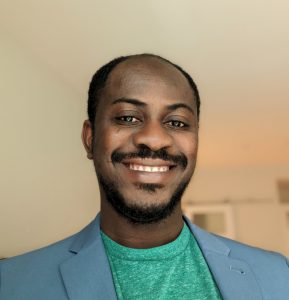
Senior Program Officer, British Columbia Public Service
I grew up in Ghana with a strong interest in politics. This began as an interest in general knowledge because I loved trivia quizzes. I always wanted to learn new facts, which exposed me to the history and politics behind these facts. From a young age, I was interested in news stories from the radio, TV and newspapers. The more stories I heard, the more my interest was piqued.
I joined my school’s debating club and took part in debating competitions against other schools. I also wrote and published articles about our school leadership, and I acted as the campaign strategist for my friends who stood in elections for school prefect positions. From these interests, it felt natural to pursue political science at university.
Privacy and surveillance in Africa are understudied. There are arguments that development challenges in Africa are partly due to the inability of governments to monitor their citizens, meaning, for example, governments may not adequately ‘know’ their citizen’s needs or how much to tax them. This has led to a proliferation of surveillance tools, which can be very dangerous in an environment where data protection regulations are still developing. During my PhD research, I advocated for the need for balance between government empowerment and the rights of citizens.
I now work for the Ministry of Children and Family Affairs at the British Columbia Public Service. My role involves developing and implementing policy, which ties in to my interests in politics. I am often assigned to tasks involving privacy, such as conducting privacy impact assessments and dealing with consent forms, which help me to stay in touch with the field I am passionate about.
Smith’s top tips
1. Read the news and stay up to date with current affairs.
2. Treat everyone’s opinions with respect. If you disagree with someone’s position, ask questions to try and see the situation from their point of view. Being a kind and tolerant human being will make you a better political scientist.
Meet Jesse

Policy Analyst, Legislative Assembly of British Columbia
As a kid, I watched lots of World War II movies with my dad. I wanted to know more about why the war happened, and as I started digging, I became interested in the political dynamics and socio-economic conditions that caused the conflict. By the time I was a teenager, my interest had expanded to current national and global politics.
Growing up, I never really knew what I wanted to do for a career. I left high school thinking I wanted to be an actor, but then went to university thinking I’d become a psychologist. After a year, I left university to spend time working and travelling. Exploring other places, meeting new people and seeing how different societies organised themselves was an illuminating experience. I decided to return to university, where I took a range of classes on topics I found interesting, which eventually led me to political science.
My current job as a policy analyst benefits from my skills in conducting research, critical thinking, problem solving and conveying information. In my previous role, I used my research skills to support parliamentary committees reviewing privacy legislation.
People don’t sufficiently consider the potential impacts of digital systems on society. We give up our personal data freely – our phones are constantly tracking where we are, what we watch, what we buy, etc. We believe we can trust the companies that collect this data, but most of us don’t understand what is being done with this information. Many people don’t think about the power of their data until something bad happens, like a privacy breach or identity theft.
Jesse’s top tips
1. Be curious and ask questions. If you don’t know the answer to something, do some research. This will help you gain knowledge and ask better questions.
2. It doesn’t matter if you don’t know what you want to do with your life yet! You will keep changing and growing, so just find something that interests you and try to do some good in the world.
Do you have a question for Colin, Smith or Jesse?
Write it in the comments box below and Colin, Smith or Jesse and the team will get back to you. (Remember, researchers are very busy people, so you may have to wait a few days.)
It is not only data protection laws that vary between democracies, but the democracies themselves. Discover how the type of electoral system can determine who governs a country:
www.futurumcareers.com/why-electoral-systems-matter-for-democracy

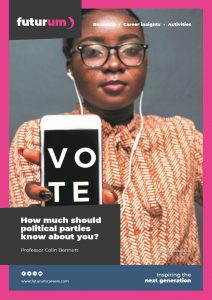
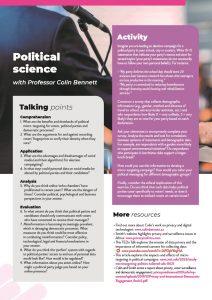
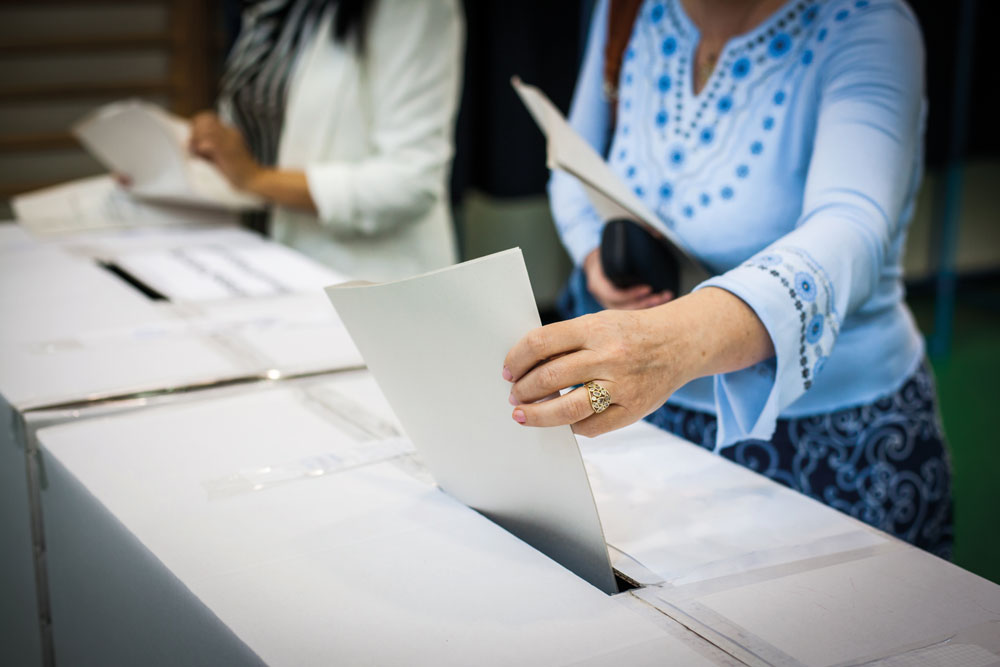



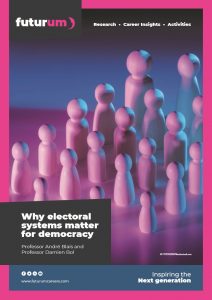
0 Comments